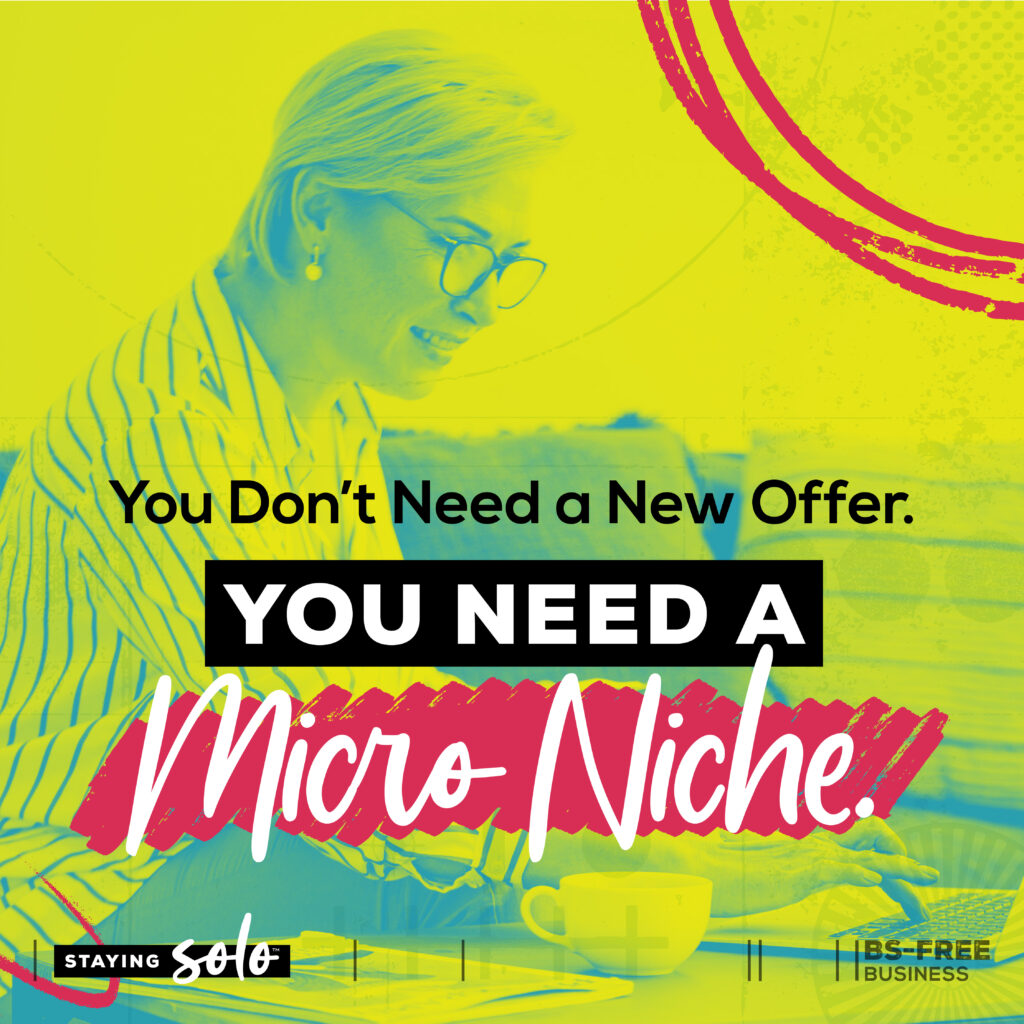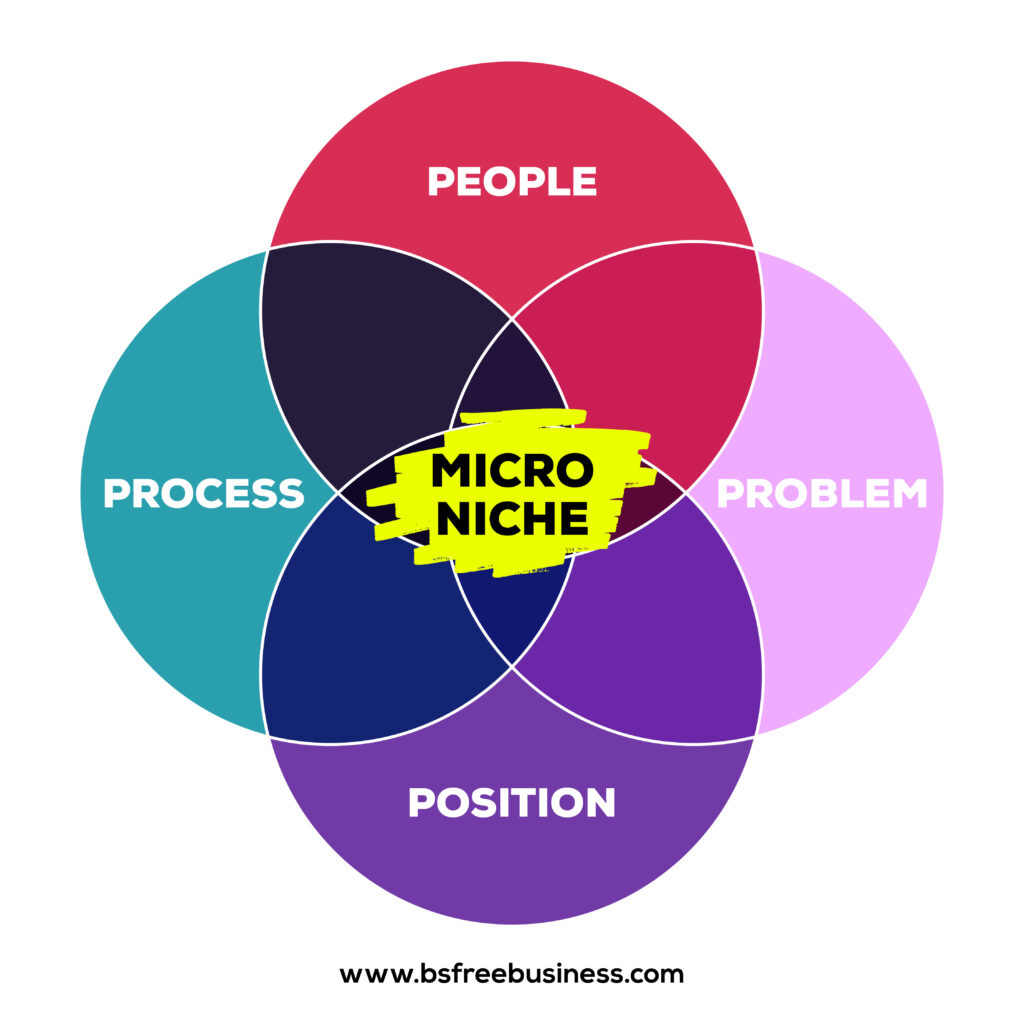
Search the site:
You Don’t Need a New Offer. You Need a Micro Niche.
When budgets shrink and buyers become more discerning, clarity becomes your greatest asset.
No one’s spending on kinda-sorta solutions anymore. If your niche is fuzzy, your offer feels optional and in a crowded, cautious market, optional is the first thing to be ignored.
Remember, generic doesn’t sell. Specificity is what makes you essential.
But this isn’t about burning it all down. It’s about making what you already do land with the right people. Because you don’t need a new offer—you need your current one to be crystal clear, specific, and essential.
And that starts with a micro niche.
When the economy’s booming, a decent brand, a dash of clever content, and even a half-baked niche might get you some business.
But when cash flow tightens? That surface-level strategy collapses. In a lean market, ambiguity is a deal-breaker.
I’m not saying this to scare you. I’m saying it so you don’t waste your time. What worked before might not cut it anymore, and that’s okay. It just means it’s time to adjust.
Because if you want your business to stay solid, even when things get unpredictable, you don’t need to blow everything up or invent a brand-new offer. What you do need is clarity. The kind that makes your services feel like a hell yes for the right people.
In this episode, I’m breaking down how to tell if your niche is too vague, why that’s likely what’s stalling your momentum, and how to sharpen it so your existing offers land with the people who need them most.
Why Most Niching Advice is Utter Trash
Let’s start here: most niching advice has become so watered down that it’s a vanilla smoothie. Bland. Boring. And not giving you what you need to grow a sustainable business.
Here’s what I mean:
Most advice sounds like:
“Pick a niche!”
“Just serve one audience.”
“Specialize and the money will come!”
Okay. But specialize in what? For who? Based on what evidence?
This advice is usually recycled from general marketing advice spouted by people with zero business giving you advice on your business. As a solo service business owner, it doesn’t consider your skills, experience, or positioning.
And it doesn’t answer the actual question, which is:
What makes someone hire you, refer you, or remember you?
Spoiler: It’s not just that you “work with coaches” or “help small businesses.”
That’s not a niche. That’s a descriptor.
This advice also ignores how many of us work with multiple types of clients across industries or in ways that don’t fit neatly into one box.
So people try to squeeze themselves into a niche that sounds good instead of one that’s strategic. And then they wonder why it doesn’t feel right or doesn’t sell.
Niching isn’t about sounding good. It’s about being findable. Being referable. Being clear.
When the Economy is Shaky, Clarity Becomes a Necessity
During good economic times, you can get away with being vague. Decent branding, clever content, and a half-baked niche may land you clients.
But when things tighten up? That surface-level strategy doesn’t cut it. People don’t spend on potential—they spend to solve real problems. And they need to know, without a doubt:
- I understand your problem.
- I know how to fix it.
- I’ve done it before.
- And I’m the best person for the job.
None of that happens if your niche is still “small business owners” or “I help people grow.”
That doesn’t sound essential. You don’t want to be someone they can “maybe” use—you want to be someone they need.
5 Signs Your Niche Isn’t Working (Even if You Think It Is)
Let’s get brutally honest here. You think you have a niche, but do you?
Here are five red flags that say otherwise:
Sign #1. You keep getting low-quality leads.
You’re getting inquiries, but they’re budget shoppers, confused about what you do, or want things you don’t offer. That’s not a pricing problem. That’s a niche and positioning problem.
Sign #2. People refer you for random things.
“Oh, she does content… or branding… or websites? I think?” When people don’t know what to say about you, they default to vague, and vague doesn’t convert.
Sign #3. Your offers feel like a mishmash.
You’ve created service packages that sort of work… but they’re generic. You’re trying to make them fit different types of clients instead of starting with who they’re for.
Sign #4. You’re constantly rewriting your bio.
Every few months, you change your headline, tagline, and services page. If it were clear, it wouldn’t need constant tweaking.
Sign #5. Your sales calls are full of explanations.
If you’re spending 20 minutes just trying to help someone understand what you do or how you work, your niche isn’t pulling its weight.
These aren’t personality quirks or business growing pains. These are symptoms of a niche that’s still too broad or too generic.
What You Need is a Micro Niche
A micro niche goes beyond surface-level descriptors. It’s not just “I work with creatives” or “I help service businesses grow.” It’s a layered strategy that helps you stand out, get referred to, and land clients faster.
A strong micro niche is made of:
- A clear problem you solve
- The people you solve it for
- A distinct position in the market
- And a repeatable process or approach

Unfortunately, too many people stop at the “people” part and wonder why their content flops and offers don’t sell. (And honestly, don’t get me started on how people don’t go nearly deep enough to understand their people!)
But when you lock in all four parts? Your business gets easier to run, sell, and more effective.
You get traction faster. You know what content to create. Your offers become apparent. Your messaging gets easier. And most importantly? You feel confident owning your lane.
Where to Start (Without Burning It All Down)
You don’t need to blow up your business to get clear. You just need to tighten the screws.
Here’s what I want you to do: Pick one of the four areas—problem, people, position, or process—and get specific.
If you can:
- Define the exact problem you solve in one sentence.
- Describe your ideal client beyond “small business owner”.
- Explain what makes you different from others doing similar work.
- Or walk someone through your signature way of working.
Start there. Even a tiny shift in clarity can help you get better-fit leads, higher-quality referrals, and more “hell yes” clients.
And if you’re feeling attacked, please know, I’ve been there myself.
Once upon a time, I offered digital marketing services for B2B companies. This sounds fine until you realize that it could mean literally anything. I worked with everyone from health and wellness brands to tech companies to real estate. There was no throughline. No real focus. Just “B2B.”
After having several less-than-ideal clients, I opted to get way more specific and focus on content production for mid-market B2B tech and professional services companies. By understanding their specific problems, I could better identify the value we deliver and how we do it.
Everything got much easier from there. More leads, more clients….and all because I was so much clearer.
The Micro Niche Workshop (And Why It’s Not Like the Rest)
If you’re listening to this and thinking, “Okay, Maggie—this is me. I thought I was clear, but I’m realizing I’m not…” that’s precisely why I created the Micro Niche Workshop inside the Squad.
We’re opening up the doors to the Squad this week only, and when you join, you’ll get immediate access to the workshop. (If you’re catching this after the week of May 26th, you can get on the wait list!)
This workshop helps you define your micro niche, so you can stop second-guessing your focus, attract better-fit clients, and make smarter decisions about your services and strategy.
No fluff. No vague advice. Just a practical, step-by-step process to get clear on what you do, who you serve, and how it all fits together.
You’ll walk away with a micro niche that supports your business, not one that boxes you in.
Define Your Micro Niche—Without Burning It All Down
If you take one thing from this episode, let it be this: You don’t need to build something new. You may not even need to overhaul your offers. (And if you do, you need to define your micro niche BEFORE that!)
You just need to get specific because clarity is what turns your existing work into something people want to buy. When your niche is clear, your services become easier to talk about, easier to sell, and easier for the right people to say yes to.
If you’re ready to stop overthinking it and actually do something about it, the Micro Niche Workshop inside the Squad is where we do exactly that.
You’ll get a focused, strategic process that helps you get specific in a way that fits your business, not someone else’s template.


I’m Maggie Patterson (she/her), and services businesses are my business.
I have 20+ years of experience with client services, am a consultant for agency owners, creatives, and consultants, and vocal advocate for humane business practices rooted in empathy, respect, and trust.
Read or Listen to the Latest
Check Out These Posts
For Solo Business Owners

Growing a solo service business is tough.
It’s even harder when you’re bombarded with BS advice that steers you away from your values and why you started your business in the first place.
This is the podcast for solo creatives and consultants who want to remain as a team of one and have zero interest in the hustle and grind of typical business teachings.
Subscribe now and never miss an episode.
For Micro Agency Owners
Most podcasts for agency owners obsess over revenue growth as the ultimate success metric.

But here’s the truth: not everyone wants to make millions. Your goal might be to build a sustainable business that lets you have a life and doesn’t run you into the ground.
Join me as I spill my shameless confessions and share everything I’ve learned about building a micro agency that skips the BS of tired and typical agency teachings.
Follow Now on All Major Podcast Platforms







